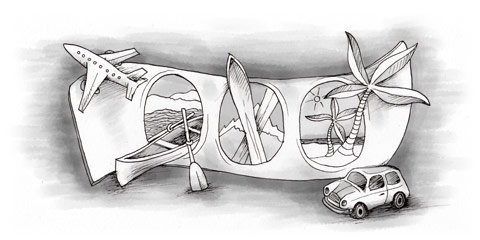How Italian car insurance works
In Italy, car insurance is applied to the vehicle itself, as opposed to the individual driver. The benefit of this is that as long you have insured your car, anyone with a valid license can drive it without having to be added to the policy. For families, this can be particularly beneficial as fewer expensive policies have to be taken out.
Registering your car in Italy
If you move to Italy from an EU country, Liechtenstein, Norway, or Switzerland and bring a vehicle with you, it will be automatically covered for third-party liability in Italy, assuming it is insured in one of those countries. If you’re moving to Italy long-term, you’ll probably want to register your car with Automobile Club d'Italia (in Italian), and get a more robust insurance package.
Italian residents with Italian license plates may choose between legally approved companies to take out their insurance policies in Italy, regardless of whether it’s with an Italian, European or non-European insurance company.
Claims history
Italian car insurance works with a risk-assessment scheme. Everybody who has car insurance in Italy is ranked in a class system, from 1 till 18, based on their claims history. There are a few things you should keep in mind when you insure your car in Italy.
Insuring your car for the first time
If you've never had a car insurance policy before you will be automatically placed in class 14, the default class.
Insuring your car when you are from the EU
If you are from the EU and are insuring your car in Italy, the insurer is obligated to recognize your no-claims history in your home country and factor this into your premium.
Insuring your car when you aren't from the EU
If you have had car insurance before, your Italian insurer may consider all accidents you may have been involved in over the past 5 years. However, they are not required to do so, in which case you will be ranked in class 14.
Codice della Strada (Highway code)
Italy’s highway code (in Italian) includes a driving license point system, with each driver starting at 20 points. Drivers lose points when they commit a driving offense, but also earn points for committing no offenses over a certain period of time.
If you lose all 20 points within one year you will be banned from driving in Italy for 2 years. The ban is reduced to 1 year if you lose them across 2 years, and to just 6 months if they are lost in 2-3 years.
Different insurance options
Third-party liability insurance
It is a legal requirement to be covered by third-party liability insurance in Italy, in order to drive on Italian roads. This level of insurance protects you in the event of material damage to another vehicle or if a road accident results in the injury or death of someone else.
Persona autovetture (personal accident policy)
Persona autovetture is not necessary to be allowed to drive on Italian roads but can be useful. It’s an annual policy which provides the insured party with compensation in the event of personal death, disability or injury. You can take out a personal accident policy for yourself or for your whole family, valid anywhere in the world.
Danni autovetture (vehicle protection insurance)
Danni autovetture protects you in the event of an accident caused by yourself or another person and can include total or partial loss. The plan goes a lot further than basic third-party liability, providing cover in instances of:
- Fire & theft
- Vandalism
- Natural phenomena
- Collision with wild animals
Choosing Italian car insurance
If you’ve just moved to Italy or are going to move soon, it’s likely your Italian language skills could still use some work. Even if you are a linguistic master, navigating the ins and outs of car insurance in a second language can be difficult, and it’s certainly something you want to know you’ve understood fully. Clement’s Italian motor insurance for expats provide a full range of car insurance policies, while their service is available completely in English.
In the case of an accident
If you have an accident in Italy or anywhere else in Italy, you simply need to contact your insurer. They are responsible for contacting the National Motor Insurance Bureau, which will act as an intermediary between the relevant insurance companies and the persons injured.


